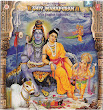Over countless generations there has been significant exchange of customs, traditions, beliefs, rituals, etc., between these different religions Such an exchange is not peculiar to India and has been occuring the world over throughout the past. In India though, the existence of many religions in the same social environment created a situation favourable for such an interchange of customs and rituals.
The other fact that some religions existing in India are offspring of the amalgam of beliefs that co-existed under the heading Hinduism. This has also led to the presence of many features of the parent religion in the offspring religions. At times this has blurred the line dividing Hinduism from the offspring religions leading occasionally to tension of the offspring religions with their parent.
One instance of this is the ire against the constitution of India wherein the term 'Hindu' includes Buddhists, Jains and Sikhs.
 | Hinduism does not have a formal priesthood. The Sadhus are traditionally those who have renounced material pleasures of life. They along with the semi-formal Brahmin clergymen are looked upon as what can come closest to a priesthood. |
But interchange of customs and rituals has taken place even between religions originating in India and those brought into India from other parts of our globe. This interchange has also been a massive one for the reason that that apart from the fusion of customs as a result of co-existence of different forms of worship, the adherents of religions originating in other parts of the globe like Christianity and Islam are largely converts from Hinduism. This does not apply in the case of Zoroastrianism and Judaism as these two religions have tended to be insular and have jealously guarded against the entry of members of other faiths by way of conversion. But even then they display many traits which they have absorbed from other religions especially Hinduism.
Although this interchange has been quite substantial, it has not succeeded in bringing about identity in many important respects. Communal riots are still not a thinq of the past, sectarian feelings are still very much with as and there normally run counter to the spirit of nationalism and secularism. The result of this is perhaps India's having the dubious distinction of being a Secular society without a common civil code. For an appraisal of contemporary Indian society to be complete we ought to examine the nature and genesis of the different religions that exist around us, and also the extent to which they have influenced each other. To obtain an insisght into every religion, we shall briefly state the history of every religion since its inception, what it has borrowed from other faiths and what it has lent to it.
We start with the religion which is not only professed by a vast majority in India, but has also been the birthplace for many customs found in other religious communities in India.
 | Ram and Sita Shri Ram is an important diety in the Hindu Pantheon. He is considered to be a Maryada Purushottam which means a person who has a balance of all good qualities. |






1 comments:
This site is really great
Post a Comment